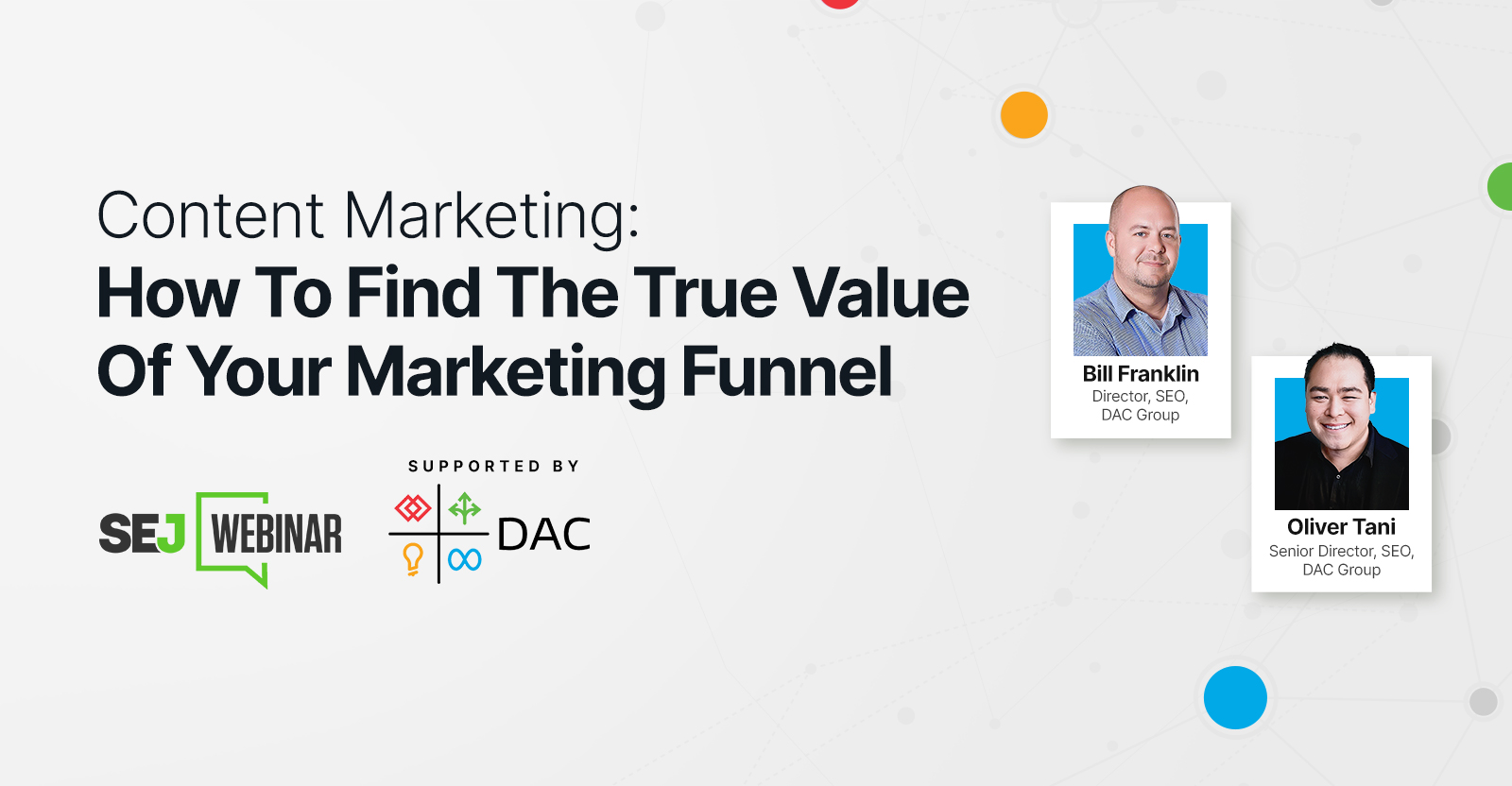SEO
The Freelance SEO’s Journey, How To Get Started In SEO

SEO is a field that’s ripe with opportunities to build fulfilling careers, though there’s no clearly defined path to getting started.
There aren’t necessarily any degrees required to work in SEO. This leaves many aspiring practitioners left to wonder how they can prove they’re qualified for the job.
You’ll probably get ten different answers if you ask ten SEO pros how they got their first job. One or more of those answers is likely to revolve around freelancing.
Working as an independent contractor is how a meaningful percentage of people get their start in SEO. Some use freelancing as a stepping stone to an in-house or agency position, while others build their whole career around it.
According to data in our State of SEO in 2022, practitioners can find significant success doing freelance work. Close to 45% of freelance and contract respondents reported earning $75,000 to $149,000.
In this article, we’ll look deeper at the data surrounding this curious group of SEO professionals.
How do you become an SEO freelancer? What does an SEO freelancer do? Most importantly, how does an SEO freelancer get clients?
This article expands on the data found in our annual State Of SEO Report. Download the full report to see the first-party data.
Many SEO Professionals Get Their Start As Freelancers
Freelancing is a popular choice for SEO professionals early in their careers.
When we asked how long SEO pros have been working in the field, over 45% of freelancer respondents said they have less than five years of experience.
That number isn’t surprising when you understand why many take the freelancing path in the first place.
If you’re not an industry veteran with an established portfolio, finding full-time work in an in-house role or agency position can be challenging.
In a field without formalized education, freelancing is a path toward building the experience employers are looking for.
With that said, freelancing isn’t exclusively an early-stage career type of gig. As our data in the next section shows, freelancers tend to earn a higher-than-average salary, which makes it a viable option to pursue long-term.
Freelancers Are A Smaller Group, But With Higher Average Income
As mentioned at the beginning of this article, 44.5% of freelance and contract respondents report earning salaries above $75,000 per year.
That number is especially notable when you look at how many years of experience freelancers have.
- Out of the total number of respondents with less than two years of experience, 9.4% were freelancers or founders.
- Out of the total number of respondents with two to four years of experience, 10.1% were freelancers or founders.
- Almost half of all freelancers and founders (45.6%) had four or fewer years of experience.
Although freelancers and founders are a relatively small group compared to others, they can often command higher rates than their peers. Only 6.7% of freelancers and founders took salaries of $34,000 or less.
However, it’s important to note that “founders” may account for the higher salary brackets found in this group, meaning that freelancers may need to build a book of business before commanding the highest rates.
How SEO Freelancers Work And Find Business
When we asked SEO freelancers which channels drive the most business, they responded:
- Network referrals (9.5%).
- Search (8.9%).
- Personal networks (8.7%).
- Organic social (7.7%).
- Upwork (7.7%).
As the data suggests, freelancers primarily rely on reputation and word-of-mouth to generate work.
This puts newer SEO practitioners at a disadvantage as they’re less likely to have the experience, portfolios, or client lists necessary to find work.
That’s where organic search and social come in. Newer freelancers can prove themselves by marketing their services using a website and social media profiles.
Freelance job boards like Upwork offer another route for freelancers to take when they don’t have the benefit of word of mouth to carry them to their next gig.
Smaller percentages of freelancers also report using paid channels such as Google Ads (7.5%) and social media advertising (6.1%) to find work.
Being An SEO Freelancer Is Difficult, But Comes With Opportunity
Freelancing isn’t for the faint of heart. In addition to being responsible for finding their own clients, freelancers are expected to provide a broader range of services than other SEO professionals.
For example, an SEO pro working with an in-house team may be solely responsible for auditing new clients’ websites. On the other hand, a freelancer may be expected to audit the site, figure out how to optimize the site to deliver better results, and then execute the plan.
Being a freelancer comes with a substantial amount of responsibility. However, there are unique opportunities in freelancing that make up for the drawbacks.
We’ve mentioned the higher-than-average salaries, and we’d be remiss not to mention the freedom afforded by freelancing.
Working in SEO as an independent contractor allows people to work from home and set their own hours. This level of flexibility can create a healthier work/life balance compared to working in an office, as freelancers can easily make time for other priorities in life.
On the other hand, you may decide to pursue freelance work only to find the benefits aren’t worth the drawbacks.
That’s perfectly fine because the experience you gain makes you more valuable to employers. After a few years of freelancing, you’re better positioned to transition into an in-house or agency role.
SEO Freelancers Can Transition Into Full-Time Employment
Being an SEO freelancer isn’t a lifetime commitment. While some flourish in it, contractor life isn’t for everyone.
The idea of finding your own clients, generating your own salary, and doing the work of multiple people is understandably intimidating. That doesn’t mean it’s not worth putting in the effort.
SEO freelancers with even a year or two of experience are uniquely qualified to transition into full-time employment.
Here’s a list of reasons why:
- Performing a wide range of services gives you experience working in many different roles.
- Building up a base of clients means you have many employment references available when applying for jobs.
- Your connections through freelancing can lead to permanent employment in other companies.
In summary, taking the road less traveled can lead to opportunities that weren’t previously available to you.
You can find all of our first-party data about the careers of freelancers, as well as SEO professionals in in-house and agency positions, in our annual State Of SEO Report.
Featured image: Paulo Bobita/Search Engine Journal
window.addEventListener( ‘load’, function() {
setTimeout(function(){ striggerEvent( ‘load2’ ); }, 2000);
});
window.addEventListener( ‘load2’, function() {
if( sopp != ‘yes’ && addtl_consent != ‘1~’ && !ss_u ){
!function(f,b,e,v,n,t,s)
{if(f.fbq)return;n=f.fbq=function(){n.callMethod?
n.callMethod.apply(n,arguments):n.queue.push(arguments)};
if(!f._fbq)f._fbq=n;n.push=n;n.loaded=!0;n.version=’2.0′;
n.queue=[];t=b.createElement(e);t.async=!0;
t.src=v;s=b.getElementsByTagName(e)[0];
s.parentNode.insertBefore(t,s)}(window,document,’script’,
‘https://connect.facebook.net/en_US/fbevents.js’);
if( typeof sopp !== “undefined” && sopp === ‘yes’ ){
fbq(‘dataProcessingOptions’, [‘LDU’], 1, 1000);
}else{
fbq(‘dataProcessingOptions’, []);
}
fbq(‘init’, ‘1321385257908563’);
fbq(‘track’, ‘PageView’);
fbq(‘trackSingle’, ‘1321385257908563’, ‘ViewContent’, {
content_name: ‘freelance-seo-professionals-survey-results’,
content_category: ‘careers-education seo’
});
}
});
SEO
Measuring Content Impact Across The Customer Journey

Understanding the impact of your content at every touchpoint of the customer journey is essential – but that’s easier said than done. From attracting potential leads to nurturing them into loyal customers, there are many touchpoints to look into.
So how do you identify and take advantage of these opportunities for growth?
Watch this on-demand webinar and learn a comprehensive approach for measuring the value of your content initiatives, so you can optimize resource allocation for maximum impact.
You’ll learn:
- Fresh methods for measuring your content’s impact.
- Fascinating insights using first-touch attribution, and how it differs from the usual last-touch perspective.
- Ways to persuade decision-makers to invest in more content by showcasing its value convincingly.
With Bill Franklin and Oliver Tani of DAC Group, we unravel the nuances of attribution modeling, emphasizing the significance of layering first-touch and last-touch attribution within your measurement strategy.
Check out these insights to help you craft compelling content tailored to each stage, using an approach rooted in first-hand experience to ensure your content resonates.
Whether you’re a seasoned marketer or new to content measurement, this webinar promises valuable insights and actionable tactics to elevate your SEO game and optimize your content initiatives for success.
View the slides below or check out the full webinar for all the details.
SEO
How to Find and Use Competitor Keywords

Competitor keywords are the keywords your rivals rank for in Google’s search results. They may rank organically or pay for Google Ads to rank in the paid results.
Knowing your competitors’ keywords is the easiest form of keyword research. If your competitors rank for or target particular keywords, it might be worth it for you to target them, too.
There is no way to see your competitors’ keywords without a tool like Ahrefs, which has a database of keywords and the sites that rank for them. As far as we know, Ahrefs has the biggest database of these keywords.
How to find all the keywords your competitor ranks for
- Go to Ahrefs’ Site Explorer
- Enter your competitor’s domain
- Go to the Organic keywords report
The report is sorted by traffic to show you the keywords sending your competitor the most visits. For example, Mailchimp gets most of its organic traffic from the keyword “mailchimp.”


Since you’re unlikely to rank for your competitor’s brand, you might want to exclude branded keywords from the report. You can do this by adding a Keyword > Doesn’t contain filter. In this example, we’ll filter out keywords containing “mailchimp” or any potential misspellings:


If you’re a new brand competing with one that’s established, you might also want to look for popular low-difficulty keywords. You can do this by setting the Volume filter to a minimum of 500 and the KD filter to a maximum of 10.


How to find keywords your competitor ranks for, but you don’t
- Go to Competitive Analysis
- Enter your domain in the This target doesn’t rank for section
- Enter your competitor’s domain in the But these competitors do section


Hit “Show keyword opportunities,” and you’ll see all the keywords your competitor ranks for, but you don’t.


You can also add a Volume and KD filter to find popular, low-difficulty keywords in this report.


How to find keywords multiple competitors rank for, but you don’t
- Go to Competitive Analysis
- Enter your domain in the This target doesn’t rank for section
- Enter the domains of multiple competitors in the But these competitors do section


You’ll see all the keywords that at least one of these competitors ranks for, but you don’t.


You can also narrow the list down to keywords that all competitors rank for. Click on the Competitors’ positions filter and choose All 3 competitors:


- Go to Ahrefs’ Site Explorer
- Enter your competitor’s domain
- Go to the Paid keywords report


This report shows you the keywords your competitors are targeting via Google Ads.
Since your competitor is paying for traffic from these keywords, it may indicate that they’re profitable for them—and could be for you, too.
You know what keywords your competitors are ranking for or bidding on. But what do you do with them? There are basically three options.
1. Create pages to target these keywords
You can only rank for keywords if you have content about them. So, the most straightforward thing you can do for competitors’ keywords you want to rank for is to create pages to target them.
However, before you do this, it’s worth clustering your competitor’s keywords by Parent Topic. This will group keywords that mean the same or similar things so you can target them all with one page.
Here’s how to do that:
- Export your competitor’s keywords, either from the Organic Keywords or Content Gap report
- Paste them into Keywords Explorer
- Click the “Clusters by Parent Topic” tab


For example, MailChimp ranks for keywords like “what is digital marketing” and “digital marketing definition.” These and many others get clustered under the Parent Topic of “digital marketing” because people searching for them are all looking for the same thing: a definition of digital marketing. You only need to create one page to potentially rank for all these keywords.


2. Optimize existing content by filling subtopics
You don’t always need to create new content to rank for competitors’ keywords. Sometimes, you can optimize the content you already have to rank for them.
How do you know which keywords you can do this for? Try this:
- Export your competitor’s keywords
- Paste them into Keywords Explorer
- Click the “Clusters by Parent Topic” tab
- Look for Parent Topics you already have content about
For example, if we analyze our competitor, we can see that seven keywords they rank for fall under the Parent Topic of “press release template.”


If we search our site, we see that we already have a page about this topic.


If we click the caret and check the keywords in the cluster, we see keywords like “press release example” and “press release format.”


To rank for the keywords in the cluster, we can probably optimize the page we already have by adding sections about the subtopics of “press release examples” and “press release format.”
3. Target these keywords with Google Ads
Paid keywords are the simplest—look through the report and see if there are any relevant keywords you might want to target, too.
For example, Mailchimp is bidding for the keyword “how to create a newsletter.”


If you’re ConvertKit, you may also want to target this keyword since it’s relevant.
If you decide to target the same keyword via Google Ads, you can hover over the magnifying glass to see the ads your competitor is using.


You can also see the landing page your competitor directs ad traffic to under the URL column.


Learn more
Check out more tutorials on how to do competitor keyword analysis:
SEO
Google Confirms Links Are Not That Important

Google’s Gary Illyes confirmed at a recent search marketing conference that Google needs very few links, adding to the growing body of evidence that publishers need to focus on other factors. Gary tweeted confirmation that he indeed say those words.
Background Of Links For Ranking
Links were discovered in the late 1990’s to be a good signal for search engines to use for validating how authoritative a website is and then Google discovered soon after that anchor text could be used to provide semantic signals about what a webpage was about.
One of the most important research papers was Authoritative Sources in a Hyperlinked Environment by Jon M. Kleinberg, published around 1998 (link to research paper at the end of the article). The main discovery of this research paper is that there is too many web pages and there was no objective way to filter search results for quality in order to rank web pages for a subjective idea of relevance.
The author of the research paper discovered that links could be used as an objective filter for authoritativeness.
Kleinberg wrote:
“To provide effective search methods under these conditions, one needs a way to filter, from among a huge collection of relevant pages, a small set of the most “authoritative” or ‘definitive’ ones.”
This is the most influential research paper on links because it kick-started more research on ways to use links beyond as an authority metric but as a subjective metric for relevance.
Objective is something factual. Subjective is something that’s closer to an opinion. The founders of Google discovered how to use the subjective opinions of the Internet as a relevance metric for what to rank in the search results.
What Larry Page and Sergey Brin discovered and shared in their research paper (The Anatomy of a Large-Scale Hypertextual Web Search Engine – link at end of this article) was that it was possible to harness the power of anchor text to determine the subjective opinion of relevance from actual humans. It was essentially crowdsourcing the opinions of millions of website expressed through the link structure between each webpage.
What Did Gary Illyes Say About Links In 2024?
At a recent search conference in Bulgaria, Google’s Gary Illyes made a comment about how Google doesn’t really need that many links and how Google has made links less important.
Patrick Stox tweeted about what he heard at the search conference:
” ‘We need very few links to rank pages… Over the years we’ve made links less important.’ @methode #serpconf2024″
Google’s Gary Illyes tweeted a confirmation of that statement:
“I shouldn’t have said that… I definitely shouldn’t have said that”
Why Links Matter Less
The initial state of anchor text when Google first used links for ranking purposes was absolutely non-spammy, which is why it was so useful. Hyperlinks were primarily used as a way to send traffic from one website to another website.
But by 2004 or 2005 Google was using statistical analysis to detect manipulated links, then around 2004 “powered-by” links in website footers stopped passing anchor text value, and by 2006 links close to the words “advertising” stopped passing link value, links from directories stopped passing ranking value and by 2012 Google deployed a massive link algorithm called Penguin that destroyed the rankings of likely millions of websites, many of which were using guest posting.
The link signal eventually became so bad that Google decided in 2019 to selectively use nofollow links for ranking purposes. Google’s Gary Illyes confirmed that the change to nofollow was made because of the link signal.
Google Explicitly Confirms That Links Matter Less
In 2023 Google’s Gary Illyes shared at a PubCon Austin that links were not even in the top 3 of ranking factors. Then in March 2024, coinciding with the March 2024 Core Algorithm Update, Google updated their spam policies documentation to downplay the importance of links for ranking purposes.
The documentation previously said:
“Google uses links as an important factor in determining the relevancy of web pages.”
The update to the documentation that mentioned links was updated to remove the word important.
Links are not just listed as just another factor:
“Google uses links as a factor in determining the relevancy of web pages.”
At the beginning of April Google’s John Mueller advised that there are more useful SEO activities to engage on than links.
Mueller explained:
“There are more important things for websites nowadays, and over-focusing on links will often result in you wasting your time doing things that don’t make your website better overall”
Finally, Gary Illyes explicitly said that Google needs very few links to rank webpages and confirmed it.
I shouldn’t have said that… I definitely shouldn’t have said that
— Gary 鯨理/경리 Illyes (so official, trust me) (@methode) April 19, 2024
Why Google Doesn’t Need Links
The reason why Google doesn’t need many links is likely because of the extent of AI and natural language undertanding that Google uses in their algorithms. Google must be highly confident in its algorithm to be able to explicitly say that they don’t need it.
Way back when Google implemented the nofollow into the algorithm there were many link builders who sold comment spam links who continued to lie that comment spam still worked. As someone who started link building at the very beginning of modern SEO (I was the moderator of the link building forum at the #1 SEO forum of that time), I can say with confidence that links have stopped playing much of a role in rankings beginning several years ago, which is why I stopped about five or six years ago.
Read the research papers
Authoritative Sources in a Hyperlinked Environment – Jon M. Kleinberg (PDF)
The Anatomy of a Large-Scale Hypertextual Web Search Engine
Featured Image by Shutterstock/RYO Alexandre
-

 PPC4 days ago
PPC4 days ago19 Best SEO Tools in 2024 (For Every Use Case)
-
SEARCHENGINES7 days ago
Daily Search Forum Recap: April 16, 2024
-

 SEO7 days ago
SEO7 days agoGoogle Clarifies Vacation Rental Structured Data
-

 MARKETING6 days ago
MARKETING6 days agoStreamlining Processes for Increased Efficiency and Results
-
SEARCHENGINES6 days ago
Daily Search Forum Recap: April 17, 2024
-

 SEO6 days ago
SEO6 days agoAn In-Depth Guide And Best Practices For Mobile SEO
-

 PPC6 days ago
PPC6 days ago97 Marvelous May Content Ideas for Blog Posts, Videos, & More
-

 MARKETING5 days ago
MARKETING5 days agoEcommerce evolution: Blurring the lines between B2B and B2C














You must be logged in to post a comment Login